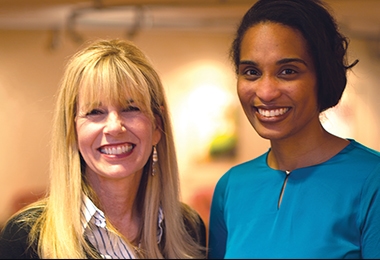[vc_row][vc_column][vc_column_text]

[/vc_column_text][/vc_column][/vc_row][vc_row el_class=”hero-header-text”][vc_column][vc_column_text]
Reimagine That
Evangelism: Say the Word
A conversation with Beth Seversen and Michelle Sanchez | March 13, 2017
[/vc_column_text][/vc_column][/vc_row][vc_row][vc_column][vc_column_text]
In the midst of ongoing cultural shifts and growing polarization, the role of the church is especially vital today. As part of our continuing series, Reimagine That, we sat down to talk with Beth Seversen, director of evangelism, and Michelle Sanchez, executive minister of Make and Deepen Disciples, to talk about why we all still need to be evangelists.
[/vc_column_text][vc_column_text]
We know that Jesus sent his disciples into the world to spread the gospel, but we hear a lot of discussion about how we do that today. In one view it means sharing the Four Spiritual Laws with strangers. Others prefer the phrase attributed to Francis of Assisi: “Preach the gospel. If necessary use words.” How do you think we need to reimagine our models of evangelism?
Beth:
In the Gospels we see four aspects of how Jesus understood his mission: 1) to seek and save the lost—to reach; 2) to restore all that is broken in the world—broken lives and broken communities; 3) to make way for the mission to be handed down to new disciples who reach and reproduce disciples; 4) and to send out disciples to the world and release them into Jesus’s mission.
So we see demonstration and proclamation go hand in hand. Jesus ministered both through healing and by proclaiming that the kingdom of God was at hand, saying, “Repent and believe the good news.” The inauguration of the kingdom of God in people’s lives was often accompanied by physical demonstrations of the kingdom.
Some of our older models of evangelism led with proclamation and neglected to demonstrate the gospel. However, in an effort to address that imbalance, we have overcorrected in some ways. Now we often demonstrate the gospel yet neglect our call to share the gospel. We need both—an integrated approach to both evangelism and justice. As one of our young church planters, John Perkins Jr., says, “We need a discipleship that leads us to justice.”
Michelle:
Yes, I agree—models such as the Four Spiritual Laws led with proclamation and sometimes even advocated sharing the gospel with strangers. I don’t have a problem with that—in fact, when I used to work for Cru (formerly Campus Crusade), I saw complete strangers make a first-time commitment to Jesus Christ with joy! What’s more, my husband commited his life to Christ in high school after reading a tract that his brother gave him. So we know that God can use any means of sharing the good news.
We often demonstrate the gospel yet neglect our call to share the gospel. We need both.
Whereas no one knows if St. Francis ever really said, “Preach the gospel and if necessary use words,” we can certainly agree with the sentiment behind the phrase. True followers of Christ should indeed demonstrate his gospel through their actions. At the same time, words are also necessary.
The irony is that Francis of Assisi is one of the most famous preachers in church history. He founded the Franciscan monastic order, a traveling brotherhood explicitly devoted to preaching. He devoted his life to preaching the gospel to every creature and was known for preaching up to five times a day. The Scriptures clearly teach that verbal witness is necessary to advance the gospel.
We often hear that millennials are seeking authenticity in every encounter. They are also less inclined to affiliate with the church than previous generations might have been. How does evangelism fit within a culture that is suspicious of any efforts that seem to “sell” the gospel?
Michelle:
This is a really important question. We need to think of sharing the gospel as “inviting,” not “selling.” We are not pitching a product. We are inviting people to experience a life-giving relationship with God! No one wants to feel duped by a sales pitch, but everyone appreciates an invitation.
Some people resist the idea of intentional evangelism, saying it feels too coercive or that they are not blessed with the gift of evangelism. How do you respond to that?
Beth:
There is unquestionably a history of abuse in the church that betrays motives around conquest, dominance, and a desire to “fix” the world and export our civilization. Almost all of us have experienced bad examples of evangelism that did not seem motivated by love for others. Many of us have even done to others in the name of evangelism what we would not want done to ourselves.
Unfortunately, rather than pursuing outreach that is sensitive and loving, we have too often jettisoned evangelism altogether. Or we’ve decided to focus exclusively on the culturally and socially acceptable enterprise of expressing compassion for the needy.
But if we genuinely love people as we follow Jesus, we will love them as whole people and we will care for them in their physical, emotional, social, and spiritual dimensions. We will share our lives, share our resources, and share the gospel.
We will also recognize that we too are needy and vulnerable. We will receive as much as we give, and be served as much as we serve. Such mutual give and take moves away from the superiority and paternalism that has too often tainted our evangelism efforts.

Michelle:
Our perfect model, Jesus Christ, shows us that it’s not either/or but both/and—we are called to minister to people in both word and deed.
How could we possibly keep the wonderful news of Jesus Christ to ourselves? I want to encourage believers not to worry about whether or not they have the elusive “gift of evangelism.” Actually, the Scriptures speak of no such gift. Paul does say in Ephesians, “So Christ himself gave the apostles, the prophets, the evangelists, the pastors and teachers, to equip his people for works of service.” So we see that there is no spiritual gift of evangelism, but there are evangelists who have been given to the church by God—and a major part of their job is to equip the rest of us to share the gospel.
It’s very curious—we don’t say, “I won’t give, because I don’t have the gift of generosity” or, “I won’t help clean up, because I don’t have the gift of service.” We are all called to fulfill the great commission, and we can all learn how to be more effective and fruitful at it. I believe God wants to surprise us with all the extraordinary ways that he can work through us ordinary people.
What does your research suggest about the church’s contemporary engagement with evangelism? What have you learned about the Covenant in particular?
Beth:
I’ve been studying the unchurched and the churches that are reaching them, and through that work we have identified how we are doing in evangelism in the Covenant. There are some wonderful things to celebrate as well as some challenges.
We distributed an online survey in the fall of 2015 that asked ECC pastors to identify the evangelism approach their church emphasizes most. The top three responses were 1) building relationships with people who are not Christians; 2) serving people who are not Christians by meeting their tangible needs; and 3) inviting people who are not Christians to church services, events, or groups.
The evangelism approach these participating ECC churches least engage is verbal articulation of the gospel. We don’t seem to talk about Jesus much with our unchurched friends. Only 5 percent of pastors reported that the evangelism approach their church emphasizes most is sharing one’s personal faith with people who are not Christians. As a Pietistic denomination that cares about lost people found and hurting people helped, we need to grow in our intentional evangelism in the Covenant.
What are our biggest obstacles to effective evangelism?
Beth:
When I ask pastors to identify their congregations’ biggest barriers to sharing their faith, they most frequently report: 1) fear of being offensive in a tolerant and multicultural, pluralistic society; 2) fear of being rejected; and 3) fear of being identified as right-wing, bigoted, separatist, unintelligent, and narrow-minded.
Because our culture is saturated by Christianity, people assume they know what we’re going to say. At the same time the “nones” who self-identify as having no religious preference are rapidly growing, especially among the emerging generation, which is less biblically literate and values church less and less. So our congregations face two rapidly growing extremes—the purely unchurched and the church dropouts. And they do not feel well-equipped to bear witness to Jesus among either group—and to everyone in between.
Michelle:
I think that one of the biggest obstacles to effective evangelism is a loss of identity. We have forgotten that the essential purpose of the church is mission —reaching the lost, healing the hurting, and making disciples. If we are not excelling at these things, then we are not fulfilling our primary mandate as the church in our broken world. We have gotten caught up in many other worthy endeavors, but we must renew our focus on missional effectiveness as our first priority.
Covenant theologian Henry Gustafson wrote that Jesus’s “primary objective was not to teach the law, but to save people—to bring them into the kingdom….That evangelism was their primary task ought not to be surprising to us….For to follow Jesus and to fish for others are like two sides of a coin; they belong together.” I love that.
What are some specific steps churches and individuals can take to reimagine how they participate in evangelism?
Beth:
In Make and Deepen Disciples we are focusing on raising the evangelism temperature in our churches. I’m most excited about our new BLESS initiative. Even though one-size evangelism doesn’t fit all, I believe BLESS has a wide appeal across ages, ethnicities, and genders to help everyone develop evangelistic practices as we develop and deepen lifelong relationships with people.
BLESS is an acronym for five missional evangelism practices that help people step effortlessly into evangelism and to get “unstuck.” We begin with prayer, listen with care, eat together, serve together, and then share our story. It’s really about how to love our neighbors—how to reach those who are far from God with the love of Jesus by blessing them. When these practices become part of our everyday lifestyle, we can begin to help the people in our circles of influence move toward faith in Christ.
Our other major initiative is our new intentional evangelism cohorts. These are two- to three-year learning communities. We begin first with lead pastors, helping them to grow in their personal evangelism and then helping them to lead a culture change in their churches. The cohorts include thirty-day accountability, instruction, inspiration, coaching, problem solving and planning in personal evangelism, and leading evangelism change.
I like to help people consider what is so potent about their relationship with Christ that they’re compelled to share it. We don’t focus on scripts but rather on the heart of God. And we can be confident knowing God is at work in the lives of others well before we arrive on the scene.
Michelle:
I used to feel that evangelism was not a natural inclination—and to be honest, I still do! For me, the most important thing is indeed to begin with prayer. God wants to reach people far more than we do. We must ask him to give us his heart for the lost, and we must believe him to accomplish great things in and through us by his power. The more we focus on God and not ourselves, the more fruitful our evangelism will be.
[/vc_column_text][/vc_column][/vc_row][vc_row][vc_column][vc_empty_space][/vc_column][/vc_row]














